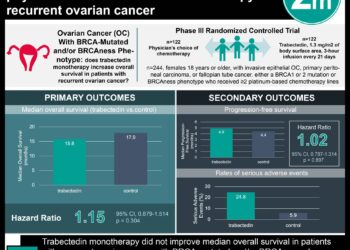Rucaparib compared to standard-of-care chemotherapy showed promising clinical and safe response to treat BRCA1 or BRCA2 mutated, relapsed ovarian carcinoma
1. The median progression-free survival was 7.4 months in the rucaparib group and 5.7 months in the chemotherapy group for both the intention-to-treat and efficacy-evaluable group.
2. Common treatment-related adverse events in patients receiving rucaparib were anemia, nausea, fatigue.
Evidence Rating Level: 1 (Excellent)
Study Rundown: Rucaparib is an oral poly(adenosine diphosphate-ribose) polymerase (PARP) inhibitor approved to treat BRCA1- or BRCA2-mutated relapsed ovarian carcinoma in certain countries. However, there is limited knowledge on the efficacy and safety data of rucaparib compared with non-platinum-based chemotherapies. Therefore, this study aimed to explore the efficacy and safety of rucaparib compared to both platinum and non-platinum-based chemotherapies in patients with BRCA1– or BRCA2-mutated, relapsed ovarian carcinoma, who have previously received two or more chemotherapy regimens. For both the intention-to-treat and efficacy-evaluable group, the median progression-free survival was 7.4 months in the rucaparib group and 5.7 months in the chemotherapy group. The efficacy group was defined as all randomly assigned patients with BRCA1 and BRCA2 mutations with no reversion mutations. Anemia/decreased hemoglobin, nausea and/or asthenia/fatigue were common treatment-related adverse events that were reported. The main limitation of the analyses included limited data for diverse ethnicities. The majority of the study population was White. Overall, this study demonstrated continual support that rucaparib can be used to treat BRCA1– or BRCA2-mutated, relapsed ovarian carcinoma. However, further investigation is required to examine the long-term efficacy and safety profile of rucaparib.
Click to read the study in The Lancet
In-Depth [randomized controlled trial]: This was an international, open-label, randomized, phase III study. Patients were enrolled if they had BRCA1– or BRCA2-mutated ovarian carcinoma and previously received at least two or more chemotherapy regimens A total of 349 patients were enrolled to receive either study treatment (n=233) or platinum-based/non-platinum-based chemotherapy (n=116). The demographic of both rucaparib and chemotherapy groups were well-balanced. The median follow-up period was 25.0 months (interquartile range [IQR]: 52-64). The median progression-free survival for the intention-to-treat population was 7.4 months (95% confidence interval [CI]: 6.7-7.9) in the rucaparib group and 5.7 months in the chemotherapy group (95% CI: 5.5-6.7). The hazard ratio [HR] was 0.67 [95% CI: 0.52-0.86; p=0.0017]. In the efficacy population, the median progression-free survival for the rucaparib group was 7.4 months (95% confidence interval [CI]: 7.3-9.1) and 5.7 months in the chemotherapy group (95% CI: 5.5-7.3). The hazard ratio [HR] was 0.64 [95% CI: 0.49-0.84; p=0.0017]. Most of the patients experienced grade 1/2 treatment-related adverse events. Common treatment-related adverse events of any grade included anemia/decreased hemoglobin (31%), nausea (51%) and/or asthenia/fatigue (41%). 27% of the patients in the rucaparib group versus 12% in the chemotherapy group experienced serious treatment-related adverse events.
Image: PD
©2022 2 Minute Medicine, Inc. All rights reserved. No works may be reproduced without expressed written consent from 2 Minute Medicine, Inc. Inquire about licensing here. No article should be construed as medical advice and is not intended as such by the authors or by 2 Minute Medicine, Inc.







